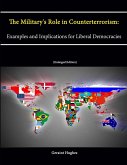The United States faces a number of significant national security threats, ranging in scope from intercontinental ballistic missiles to the use of weapons of mass destruction (WMD) by terrorists. The debate over the seriousness of the various threats has intensified recently. Various studies and commissions have recommended far reaching changes in the U.S. approach to domestic preparedness and response to threats to the homeland. Many experts believe the probable long term effects of a WMD attack by terrorists on the population, environment, and the economy make it imperative that the U.S. be fully prepared to either deter or interdict an attempted terrorist attack. This paper reviews the current legislation and policies that govern the military's role when supporting law enforcement in a domestic terrorism crisis and highlights some of the issues confronting the U.S. government. To fully understand the military's role in domestic crisis response it is necessary to explore existing national level structures and response options prior to the involvement of military forces. Crisis management is predominately a law enforcement function that manages the resources necessary to prevent or resolve a terrorist incident, including one involving WMD. Current U.S. government terrorism response policy is contained in presidential directives.








